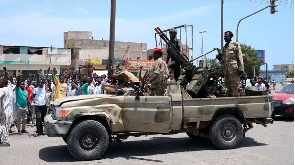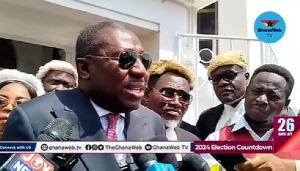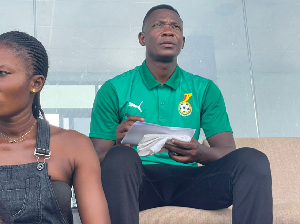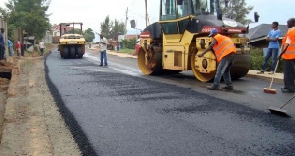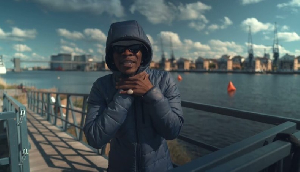The International Criminal Court (ICC) has opened a new probe into alleged war crimes in Sudan, its chief prosecutor said Thursday, expressing major concerns over the escalating violence.
Karim Khan made the announcement in a report to the UN Security Council after three months of war between feuding generals have plunged the country back into chaos.
The ICC has been investigating crimes in Sudan's Darfur region since 2005 after a referral by the UN Security Council, and the Hague-based court has charged former leader Omar al-Bashir with offenses, including genocide.
Allegations of atrocities have mounted during the recent fighting, with the top UN official in Sudan calling for the warring sides to face accountability.
About 3,000 people have been killed and three million displaced since violence erupted between Sudan Army chief Abdel Fattah al-Burhan and his former deputy Mohamed Hamdan Daglo's Rapid Support Forces (RSF) paramilitary group.
The pair were key figures in a 2021 military coup that derailed the country's transition to civilian rule, after the ouster and detention of Bashir in 2019.
Darfur massacres again?
The UN has warned of possible new massacres in Darfur, saying Thursday that the bodies of at least 87 people allegedly killed last month by the RSF and their allies had been buried in a mass grave in Darfur.
"The simple truth is that we are... in peril of allowing history to repeat itself — the same miserable history," Mr Khan told the UNSC
"If this oft-repeated phrase of 'never again' is to mean anything, it must mean something here and now to the people of Darfur that have lived with this uncertainty and pain and the scars of conflict for almost two decades."
He said there has been a "wide range of communications" about alleged war crimes and crimes against humanity since fighting broke out in April, while the risk of further offenses was "deepened by the clear and long-standing disregard demonstrated by relevant actors, including the government of Sudan, for their obligations."
The US State Department welcomed the new probe.
"Let this be a message to all who commit atrocities, in Sudan and elsewhere, that such crimes are an affront to humanity," spokesman Matthew Miller said in a statement.
Even before the recent fighting broke out, Mr Khan said in the report, there was a deterioration in Sudan's cooperation with UN investigators.
Sudan's UN ambassador denied this.
"The government of Sudan has constantly cooperated with the ICC," Ambassador Al-Harith Idriss Al-Harith Mohamed said.
The lack of justice for crimes in Darfur in the early 2000s, when Bashir set his Janjaweed militia upon non-Arab minorities, had "sown the seeds for this latest cycle of violence and suffering," he added.
Bashir was charged with genocide, war crimes, and crimes against humanity, including murder, rape, and torture and the court has been demanding his extradition to The Hague ever since, without success.
After Bashir was toppled in 2019, Sudan pledged to hand him over to the court for prosecution, but this never happened.
Even before the recent fighting, there was a "further deterioration in cooperation from Sudanese authorities," Khan said.
Bashir, 79, and Ahmad Harun and Abdel Raheem Hussein, two leading figures in the former dictator's government who are also wanted by the ICC, are still at large. So far, the only suspect to face trial for violence committed in Sudan is senior Janjaweed militia leader Ali Muhammad Ali Abd al-Rahman, also known by the nom de guerre Ali Kushayb. Rahman's defense lawyers are expected to open their case next month, and Khan said the latest Sudan fighting "cannot be permitted to jeopardize" the trial.
The United Nations says 300,000 people were killed and 2.5 million people displaced in the 2003-4 Darfur conflict.
A summit of leaders from Sudan's neighbors met in Cairo Thursday, urging an end to the fighting, but gun battles, explosions, and the roar of fighter jets continued in the capital Khartoum.
UN Secretary-General Antonio Guterres early in the week expressed concern that the skirmishes had pushed the country to the brink of a full-scale civil war, potentially destabilizing the region.
This warning came as the fighting in the capital Khartoum escalated, with air strikes reported on July 9 near the presidential palace and in Omdurman, as well as machine gun and artillery fire in the city's south.
Mr. Guterres condemned the air strike, which a spokesman said killed at least 22 people and wounded dozens.
Peace efforts were stepped up as the war entered its third month and took an ethnic turn.
But the battle to save Sudan is turning into a toxic mix of suspicions, political self-serving, and uncertainty.
And as violence spread across the country, including Kordofan, Darfur, and Blue Nile, displacing three million people, 800,000 of them beyond the country’s borders, mediators are struggling to have adversaries cease-fire.
Contest for legitimacy
One problem, that came out this week, is the struggle for General Burhan to present himself as the bona fide leader of Sudan. His side has thus refused a portrayal by mediators that he is equal to his rival Daglo.
Al-Burhan rejected — once again — a quartet of the Intergovernmental Authority on Development (Igad) led by Kenya President William Ruto. His problem with Dr. Ruto is that the Kenyan leader is allegedly close to Daglo, with whom he did business in the past under the regime of Omar al-Bashir. Dr. Ruto, however, has stated that the Sudan protagonists must stop fighting.
“The situation in Sudan is dire: Millions of people have been displaced while lives lost has hit more than 2,000,” Dr Ruto said.
“The intensity and scale of the humanitarian crisis is a harrowing tragedy that calls for a bold and an all-inclusive peace dialogue,” Dr. Ruto said in Addis Ababa on July 10, where he met with Ethiopia Prime Minister Abiy Ahmed and representatives from South Sudan and Djibouti, who form the Igad Quartet on Sudan.
“The Igad Quartet implores the parties to this conflict to declare and observe an unconditional ceasefire and establish a humanitarian zone — spanning a radius of 30km in Khartoum — to facilitate delivery of humanitarian assistance.”
President Ruto, who leads the quartet, thinks this can help resume the final phase of the political process, paving the way for the formation of an inclusive transitional process. Except Burhan wants him out, and Khartoum has warned it could leave the bloc if Ruto continues to impose himself on it.
Igad is chaired by Ismail Omar Guelleh, President of Djibouti, but Dr. Ruto has been seen to take a leading role in pushing its role in peacekeeping in the Horn of Africa. But that has not gone down well with Gen Burhan, who also lay into Dr. Abiy, accusing him of suggesting there is a leadership vacuum in Khartoum.
Gen Burhan led a coup, cooperating with Daglo, on October 25, 2021, and toppled the transitional government of Prime Minister Abdalla Hamdok. Hamdok’s shadow has lingered on, however, and sources told The EastAfrican, the Igad Quartet wants him to be a part of the inclusive political process that could bring together other players beyond the SAF and RSF.
After the meeting in which representatives of SAF and RSF were invited, the Quartet suggested a non-fly zone on Sudan, a 30km-radius humanitarian corridor in Khartoum, a possible deployment of the now dormant East African Standby Force as well as a withdrawal of heavy artillery from the waterfront.
All these were rejected by Khartoum — or Burhan.
The Sudan Foreign Ministry dismissed the Addis meeting as an imposition.
“The disrespect of Igad towards the opinions of its member states will cause the Sudanese government to rethink the utility of its membership in the organization,” the ministry said in a statement.
“We denounce his (Prime Minister Abiy Ahmed’s) call for an air embargo and disarmament of heavy artillery, contrary to his existing direct positions and understandings with the President of the Transitional Sovereignty Council and Commander-in-Chief of the Armed Forces. The Government of Sudan considers the above statements as an unacceptable infringement on the sovereignty of the Sudanese state.”
Igad’s efforts are not isolated.
This week, Egypt also attempted another go at solving the conflict, where regional leaders of South Sudan, Kenya, Ethiopia, and Djibouti tried, in vain, earlier, to pull off a face-to-face meeting between the two protagonists. Egypt President Abdel Fattah al-Sissi gathered counterparts from Ethiopia, Central African Republic, Eritrea, Chad, and Libya under the Sudan Neighbouring Summit and there was no concrete solution on whether there will be a face-to-face meeting between SAF and RSF.
Acknowledgement
“The summit is concerned by the escalation of the conflict, repeated violations of the various ceasefire agreements, and the spread of violence outside of Khartoum to the other parts of Sudan particularly in Darfur as well as Kordofan where it is assuming ethnic and religious dimensions,” the leaders said.
The Egypt summit chaired by President Abdel Fattah el-Sisi agreed to establish a ministerial mechanism that will convene its first meeting in Chad to set an executive action plan to stop the fighting and to reach a comprehensive settlement to the crisis in Sudan.
But at least the warring generals acknowledged the Cairo process.
RSF has in the past seen Egypt as leaning towards Burhan, as shown in the early days of the war when they briefly detained Egyptian troops caught in the war on Sudan soil, where they had been training local soldiers under Ssf.
There may be another problem, however. When the violence erupted on April 15, the contest was mainly between Saf and RSF. Now, even the main protagonists cannot control its spread.
Last month, South Darfur, for example, saw its biggest eruption of violence causing at least 30 deaths between June 23 and 27, humanitarian agencies reported.
First, it was RSF versus Saf in Nyala town, then in West Darfur, a situational report by the UN High Commissioner for Human Rights said there had been executions as well as roadside assassinations of travelers.
In the Blue Nile, Sudan People’s Liberation Movement-North al-Hilu faced up with Saf, according to a statement by the local UN Integrated Transition Assistance Mission in Sudan (Unitams).
For Egypt and Ethiopia, however, their involvement may be involuntary: They have received a combined 500,000 refugees since the war, making it a new burden on their soil. The two also share the Nile with Sudan, and this sharing has been the subject of a long-running row.
Sudan remains the biggest headache in Africa, however, and what is complicating the conflict there are the disparate interests in the region and beyond due to security and economic interests.
It does not help matters that some key players, such as South Sudan, Kenya, Ethiopia, CAR, Egypt, Chad, and Eritrea, are also struggling with their own internal conflicts and political crises.
South Sudan President Salva Kiir, who had taken the initiative to use his past association with the two Sudan generals to bring them together, appears to be taking a backseat. President Kiir and Djibouti Guelleh did not attend the July 10 Igad summit in Addis Ababa.
The African Union, Igad, the Jeddah process led by the US and Saudi Arabia, and the League of Arab Nations scrambled without success to come up with a solution. Mediators in Jeddah accused parties of not being serious about the search for peace.
Egypt, a former colonial co-ruler of Sudan, has immense vested interests, including long-running military cooperation, and the fact that Sudan is an ally of Cairo’s position on the use of the Nile.
Mohamed Anis Salem, a member of the Egyptian Council for Foreign Relations, says Egypt must assume a leading role in diplomatic efforts aimed at ending the war, given the magnitude of its interests in Sudan, especially now that others already have tried and failed.
But, then, Cairo’s decision in June that requires all Sudanese to obtain visas to enter Egypt has, according to Human Rights Watch, drastically reduced access to safety for women, children, and older people fleeing the ongoing conflict. Egypt has to date received more than 250,000 refugees from Sudan.
Sudan, Africa’s third-largest country in land area, remains a key pillar of stability in the continent, especially the Eastern African region.
Case for sanctions
In the meantime, the United Kingdom on July 12 imposed sanctions on six companies considered to be supporting or benefiting from the conflict in Sudan.
The businesses are three each associated with the leadership of Saf and RSF. The sanctions will ensure that any assets held in the UK by these conglomerates and companies will be frozen.
The UK government announced that the strict measures will cut funding sources and pressure the warring parties to engage in the peace process, allow access to humanitarian aid, and end atrocities against the Sudanese people.
According to the UK, the companies associated with the RSF are Al-Junaid, a conglomerate set up by the paramilitary leader Gen Daglo, which has provided tens of millions of dollars in financial backing for the militia, enabling it to sustain the fight.
The other is GSK Advance Company Ltd, a key front owned by the RSF, providing some funding to the militia to support the purchase of war materials, and Tradive General Trading Co, a company supplying RSF with funds and materiel, including vehicles retrofitted with machineguns for patrolling the streets.
Associated with Saf is Defence Industries Systems (DIS), a conglomerate that provides finances for Gen Burhan DIS has more than 200 companies and makes a profit of $2 billion per annum.
Others are Sudan Master Technology, a company involved in the sale of arms with close commercial ties to DIS, the economic and manufacturing arm of the Sudan Armed Forces, which supplies it with funds and equipment, and Zadna International Company for Investment Ltd, another DIS subsidiary reported to be one of its top three “major earners.” The US had imposed similar sanctions a month ago, seeking to curtail a supply of weapons and money to the parties.
“The Government of Sudan welcomes the outcomes of the summit of Sudan’s neighboring countries… We also extend our thanks to the neighboring countries of Sudan that have expressed positions supportive of the security and stability of Sudan,” said a statement.
The RSF also welcomed the outcome of the meeting.
“We welcome the Sudanese neighboring countries summit, calling for the integration of all international and regional efforts to unify the proposed initiatives to facilitate and expedite the comprehensive resolution, particularly with the Jeddah platform and the Igad initiative,” RSF said in a statement.
Africa News of Saturday, 15 July 2023
Source: theeastafrican.co.ke





